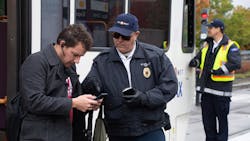TriMet increases fare enforcement on transit system
TriMet is adding nine new fare inspectors to increase the ranks of its fare enforcement teams, which already has three dedicated fare inspectors.
Other staff conduct fare enforcement assignments on a rotating basis but perform other duties as well, such as coordinating extra transit service after a Portland Blazers game or responding to a passenger having a medical issue. For these 12 fare inspectors, enforcing TriMet’s Code of Conduct for riding, including the requirement to have proof of valid fare, will be their primary job.
The nine new fare inspectors began their field training Oct. 21 and riders should expect to see them out on the system and expect to have their fare checked. During this phase of training, you may see large groups working together. Once fully trained, fare inspectors will break into teams of two to do random fare inspections on trains and buses, and at stations and transit centers.
Fare inspectors will be joined by contract customer safety officers. These officers will assist riders and inspectors during fare checks. The teams will be assigned to geographical regions in the service area so they can get to know daily riders better and the riders can get to know them. These fare enforcement teams will also provide a security presence on the system. TriMet will be evaluating the new approach for fare enforcement and possibly look at bringing in more dedicated fare inspectors in the future.
“Every interaction with a customer is an opportunity to make a positive difference,” said TriMet Director of Security and Emergency Management Pat Williams. “While our new fare inspectors begin training on the system, they have already received weeks of training on how to provide good customer service, how to be compassionate while still making sure people follow the rules and how to de-escalate tense situations.”
Fare is fair
TriMet requires fares to ride the transit system and says it’s the second largest source of funding and accounts for more than 16 percent of revenue. The money that comes in helps provide bus and rail service in a 533-square-mile area, across 60 miles of light-rail track, 14.7 miles of commuter rail track and 981.5 miles of bus routes. It pays for the vehicles, the maintenance of those vehicles and the tracks trains run on, the shelters and benches at stops and stations, the information about when the bus or train will arrive and more.
While some riders question the cost of the fare, it’s important to realize every rider on the TriMet system is subsidized. No one is paying the real cost of taking a trip on TriMet. For instance, riders who pay $2.50 for an adult two-and-a-half-hour ticket would pay $5.06 per ride if paying the full cost of the service.
TriMet also offers the Honored Citizen reduced fare. It gives riders living on a low income, seniors who are 65 and older, Medicare beneficiaries and riders with a mental or physical disability the option of paying less. TriMet also has reduced fare for youth and children under age seven ride free.
